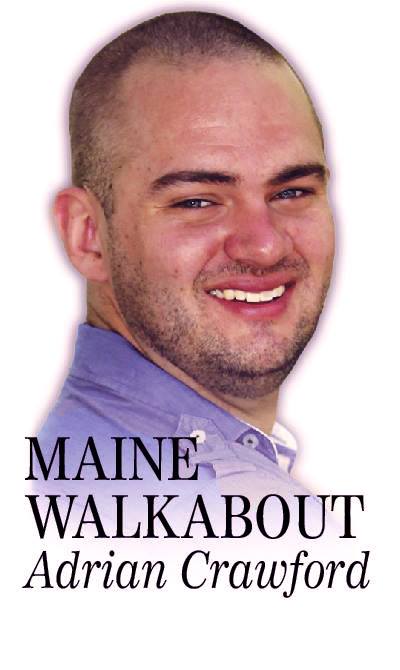During the six years before I relocated to Maine, I spent a great deal of my vacation time traveling around the United States.
In fact, I’ve seen more of the land of the free than I have of the land down under. At last count, I believe I’ve been to around 30 states. Many of the locals I’ve met in that six-year span tell me that I’ve probably seen more of the U.S. than they have.
To that end, it’s been somewhat surprising to find that many of the people whose acquaintance I’ve made over the past 12 months in central Maine are lifelong Mainers, or folks who’ve spent time away but have since returned and are determined never to leave.
It still amazes me that even within the first two weeks of my maiden voyage here in 2008, I got to see the sprawling metropolis of Los Angeles, the bright lights and multiple personalities of Las Vegas, the natural beauty of the Grand Canyon and Monument Valley, Pueblo-style architecture in Santa Fe, Cajun cuisine in Louisiana — I could go on all day. And will, if you buy me a beer and let me.
So, knowing that I’ve strived to see as much of the U.S. over the past six years as I possibly could, the idea that others would be perfectly content to stay put in Vacationland forever without experiencing so much of this great nation was something I couldn’t quite get my head around.
Back in February a guy I got talking to on a day trip to Bangor explained it perfectly to me. He was part of the group of Mainers who’d moved away, met someone and got married, but eventually found himself drawn back to the Pine Tree State, where he intends to remain.
Forgive me for paraphrasing, because my notes from 10 months ago don’t capture the exact conversation, but the reason he gave me for why people find themselves not wanting to leave Maine is about “other people.”
This state, he explained to me, isn’t always the easiest place to live. We’re way up in the Northeast, and the large centers of population are spread out, so isolation can be a factor. The winters are often long and brutal, the cost of living can be high compared to your income and the demographic is the oldest in the country.
But through all the hurdles, there’s a common thread: People helping other people through those difficult times. Folks come to Maine, my new acquaintance told me, and end up becoming intertwined in communities and tight-knit groups of friends who’d do anything for them, and vice versa.
I’d intended to use this insight in a column back in February, although it never got off the ground. In any case, the sentiment stayed with me over the months, both in my drafts folder and in the back of my mind. But with close friends more tough than expected to come by, it was a perplexing concept to truly fathom.
While it’s now been more than a year since I moved here, and I’ve embraced central Maine as my home, for the majority of my stay there’s been something of an emotional disconnect with the community. I put that down to not having grown up here and forged the lifelong bonds with people, schools and other places along the way. It’s a byproduct of being from away, I guess.
When the Kennebec Journal and Morning Sentinel reported on the tragic deaths of Cassidy Charette, Nora Birch and Kelsey Stoneton, it was impossible to not be affected by the passing of three people so young, or moved by the solidarity their communities displayed, but to my dismay I again felt that strange disconnect.
Recently, though, some equally devastating news from Australia gave me both a taste of that grief and a deeper empathy for the losses that the Oakland and Messalonskee communities suffered.
On Thanksgiving Eve, having a beer as last call approached, I followed along via Twitter as the media back home broke the news that Phillip Hughes, a 25-year-old country boy who played on the Australian cricket team, had died of injuries suffered when he was struck on the neck by a ball during a match two days prior.
I feel no shame in admitting that I wept. I had no personal connection to Phillip Hughes — I’d interviewed him once in my career, shortly before I left Australia for good, and found him to be an open and friendly guy — but the news crushed me. He was a young man who’d overcome adversity in his sporting career, worked hard and proved his critics wrong, and he died playing the game he loved.
Those tears that night weren’t the last I shed, but as media coverage unfolded in the days that followed, and I watched Australia and the cricket community around the world pour its collective heart out, I began to understand more clearly the heartbreak that the family and friends of the three young central Maine women must feel.
On top of that empathy, my feeling of being a part of my community has steadily grown over the past couple of months, and the insight I received in February about support networks of good people being the “magnet to Maine” makes a lot more sense.
I’m lucky enough to be spending the holidays around people I’ve come to care about, and I hope all of you out there are in the same position. Merry Christmas to all.
Adrian Crawford is a Web editor at the Kennebec Journal and Morning Sentinel. Email him at acrawford@centralmaine.com. Maine Walkabout is published the first and third Sundays of each month. More of his adventures in Vacationland can be found at www.crawfinusa.com.
Send questions/comments to the editors.


